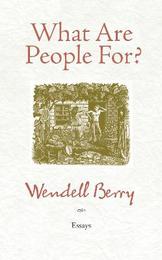
|
What Are People For?: Essays
Paperback / softback
Main Details
| Title |
What Are People For?: Essays
|
| Authors and Contributors |
By (author) Wendell Berry
|
| Physical Properties |
| Format:Paperback / softback | | Pages:224 | | Dimensions(mm): Height 203,Width 127 |
|
| ISBN/Barcode |
9781582434872
|
| Classifications | Dewey:814.54 |
|---|
| Audience | |
|---|
|
Publishing Details |
| Publisher |
Counterpoint
|
| Imprint |
Counterpoint
|
| Publication Date |
25 May 2010 |
| Publication Country |
United States
|
Description
Wendell Berry identifies himself as both "a farmer of sorts and an artist of sorts," which he deftly illustrates in the scope of these 22 essays. Ranging from America's insatiable consumerism and household economies to literary subjects and America's attitude toward waste, Berry gracefully navigates from one topic to the next. He speaks candidly about the ills plaguing America and the growing gap between people and the land. Despite the somber nature of these essays, Berry's voice and prose provide an underlying sense of faith and hope. He frames his reflections with poetic responsibility, standing up as a firm believer in the power of the human race not only to fix its past mistakes but to build a future that will provide a better life for all.
Author Biography
Wendell Berry is the author of fifty books of poetry, fiction, and essays. He was recently awarded the Cleanth Brooks Medal for Lifetime Achievement by the Fellowship of Southern Writers and the Louis Bromfield Society Award. For over forty years he has lived and farmed with his wife, Tanya, in Kentucky.
ReviewsPraise for Wendell Berry "Wherever we live, however we do so, we desperately need a prophet of responsibility; and although the days of the prophets seem past to many of us, Berry may be the closest to one we have. But, fortunately, he is also a poet of responsibility. He makes one believe that the good life may not only be harder than what we're used to but sweeter as well." --The New York Review of Books "He is ... the prophetic American voice of our day." --Christian Science Monitor
|